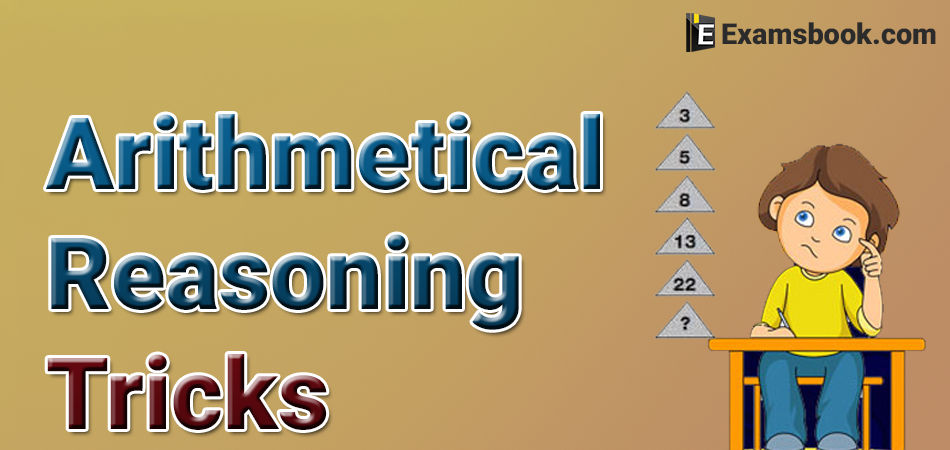Types of Arithmetic Problems with Solutions

Arithmetical reasoning is an important topic in verbal reasoning. So, here I am sharing arithmetical reasoning tricks for your better preparation. You can easily obtain good marks in the competitive exams by understanding these important tricks.
Important Arithmetical Verbal Reasoning Tricks
Introduction:
The Arithmetical Reasoning tests your ability to do real-life, basic, mathematical calculations derived from simple word problems. In order to do well on the Arithmetical Reasoning, you have to remember that there two parts to it: Arithmetical and Reasoning.
You usually have to use both of these skills for each the arithmetical part comes in when you have to perform mathematical operations such as addition, subtraction, multiplication, land division.
The Reasoning comes in when you figure out what numbers to use in your calculations. In other words, Arithmetical Reasoning tests how you apply your ability to perform to calculations to everyday, real-life types of problems.
Types of Arithmetical:
A. Data base question -
Direction: The following questions are based on the given data for an examination.
(A) Candidates appeared - 10500
(B) Passed in all the five subjects – 5685
(C) Passed in three subjects only - 1498
(D) Passed in two subjects only - 1250
(E) Passed in one subject only - 835
(F) Failed in English only - 78
(G) Failed in Maths only - 275
(H) Failed in Physics only - 149
(I) Failed in Chemistry only - 147
(J) Failed in Biology only - 221
Example.1. How many candidates failed in all the subjects?
(A) 4815
(B) 3317
(C) 2867
(D) 362
Ans . D
Clearly, candidate failed in all the subjects
= (Candidates appeared) – (Candidates passed in 1, 2, 3 or 5 subjects + candidates failed in 1 subject only)
= 10500 – (5685+1498+1250+835+78+275+149+147+221)
= 10500 – 10138 = 362.
Hence, the answer is (d).
Example.2. How many candidates passed in at least four subjects?
(A) 6555
(B) 5685
(C) 1705
(D) 870
Ans . A
Candidates passed in at least four subjects
= (Candidates passed in 4 subjects) + (Candidates passed in all 5 subjects)
= (Candidates failed in only 1 subjects) + (candidates passed in all 5 subjects)
= (78+275+149+147+221)+5685 = 870 + 5685 = 6555.
Hence, the answer is (a).
Example.3. How many candidates failed because of having failed in four or less subjects ?
(A) 4815
(B) 4453
(C) 3618
(D) 2368
Ans . B
= (Candidates failed in only 1 subjects) + (Candidates failed in only 2 subjects) + (Candidates failed in only 3 subjects) + (Candidates failed in only 4 subjects)
= (Candidates failed in only 1 subjects) + (Candidates Passed in only 3 subjects) + (Candidates Passed in only 2 subjects) + (Candidates Passed in only 1 subjects)
= ( 78+275+149+221) + 1498+ 1250 + 835 = 4453.
Hence, the answer is (b).
B. Calculation – Based Problems
Example.1. Five children take part in a tournament. Each one has to play every other one. How many games must they play?
(A) 8
(B) 10
(C) 24
(D) 30
Ans . B
Clearly, we will consider the following matches:
(i) matches of first player with other 4 players;
(ii) matches of second player with 3 players other than the first player;
(iii) matches of third player with 2 players other than the first and second players;
(iv) matches of fourth players with one player other than the first three players.
So, number of matches played during the tournament = 4+3+2+1 =10.
Hence, the answer is (b).
Example.2. In an examination, a student scores 4 marks for every correct answer and loses 1 mark for every wrong answer. If he attempts in all 60 questions and secures 130 marks, the number of questions he attempts correctly, is
(A) 35
(B) 38
(C) 40
(D) 42
Ans . B
Let the number of questions attempted correctly be x.
Then, number of incorrect ones = (60 - x).
⸫ 4x – 1 (60 – x) = 130 ↔ 5x = 190 ↔ x = 38.Hence, the answer is (b).
Example.3. A man has a certain number of small boxes to pack into parcels. If he packs 3, 4, 5 or 6 in a parcel, he is left with one over; if he packs 7 in a parcel, none is left over. What is the number of boxes, he may have to pack?
(A) 106
(B) 301
(C) 309
(D) 400
Ans . B
Clearly, the required number would be such that it leaves a remainder of 1 when divided by 3, 4, 5 or 6 and no remainder when divided by 7. Thus, the number must be of the form (L.C.M. of 3, 4, 5, 6) x + 1 e. (60x + 1) and a multiple of 7. Clearly, for x = 5, the number is a multiple of 7. So, the number is 301. Hence, the answer is (b).
If you face any problem regarding arithmetical reasoning tricks, you can ask me in the comment section. Visit on the next page to know more.



